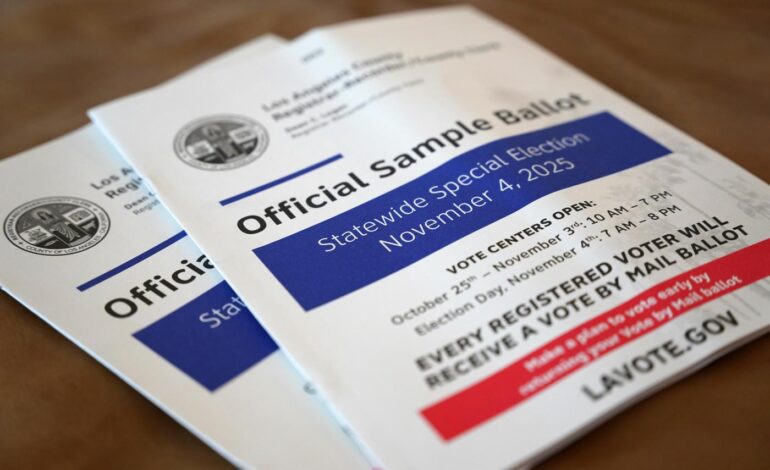Voters Rally Behind Proposition 50 to Safeguard Democracy

The call to action for voters in California is growing as citizens urge support for Proposition 50, a measure advocating for fair representation in government. Proponents argue that recent gerrymandering efforts in states like Texas and Missouri threaten the very foundation of democracy, prompting the need for a legislative response.
Support for Proposition 50
Lisa Meltzer Penn, a Belmont resident, emphasizes the importance of voting “yes” on this initiative. She recalls childhood disputes over fairness among siblings and draws parallels to the current political landscape, asserting that the recent redistricting efforts led by the current administration undermine democratic principles. “Proposition 50, California’s ‘Election Rigging Response Act,’ levels the playing field,” she argues. The proposition aims to counteract what many view as an unfair manipulation of electoral districts, restoring equitable representation for all voters.
In addition to supporting Proposition 50, community members are also focusing on local elections. Marcia Fariss, a resident of Saratoga, has expressed her support for Yan Zhao as the county assessor. With extensive experience in the technology sector, Zhao plans to modernize the Assessor’s Office, ensuring that residents are treated fairly and with respect. Fariss urges voters to consider Zhao’s community involvement and her dedication to serving the public interest.
Transportation Initiatives and Funding Concerns
In transportation news, Russell Weisz advocates for the continuation of the zero-emission passenger rail service in Santa Cruz County. He argues that this initiative would alleviate congestion on Highway 1 and provide reliable transportation options for residents. The Santa Cruz County Regional Transportation Commission (RTC) is encouraged to utilize local contractors and grants to fund the project, rather than relying on external consultants.
Furthermore, Weisz highlights that previous efforts to pursue railbanking have not aligned with the community’s desires. A significant majority of voters—73%—have expressed their preference for both a train and a trail, indicating a strong desire for comprehensive transportation solutions.
On a broader scale, Diego Certa from Campbell discusses the Affordable Care Act (ACA) and its critical role in American healthcare. He argues that the projected annual cost of the ACA, approximately $82 billion in 2024, is justifiable when compared to other governmental expenditures. Certa insists that the ACA is an essential investment in the health and productivity of citizens, advocating for bipartisan cooperation in Congress to ensure its continuation.
Addressing Poverty and Food Security
Concerns about poverty and food security are also at the forefront of public discourse. According to the U.S. Census, 35.9 million Americans were living in poverty as of 2024, many of whom rely on the Supplemental Nutrition Assistance Program (SNAP) and the Special Supplemental Nutrition Program for Women, Infants, and Children (WIC) to meet their nutritional needs.
Pravin Soni from Sunnyvale has raised alarms over potential changes to SNAP benefits due to the ongoing One Big Beautiful Bill Act. He warns that without immediate action from Congress, millions could lose access to this essential program, potentially delaying benefits in November 2025. Soni urges legislators to prioritize a bipartisan budget that secures food assistance for vulnerable populations.
Amid these discussions, Rosemary Everett from Campbell voices her concerns regarding the humanitarian crisis in Gaza. While expressing sympathy for the Jewish people, she criticizes the actions of the Israeli government, which she claims have resulted in significant loss of life and suffering among Palestinians. Everett describes the situation as a humanitarian catastrophe, calling for greater awareness and action to address the ongoing violence.
The upcoming elections present an opportunity for voters to influence these critical issues, from local governance to national policies. As California residents prepare to cast their ballots, the emphasis on democracy, community involvement, and social responsibility remains at the forefront of the conversation.






